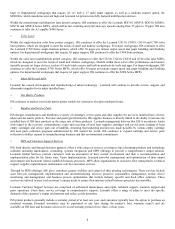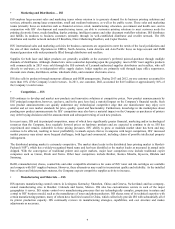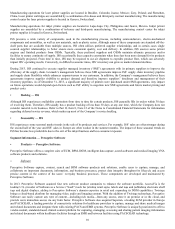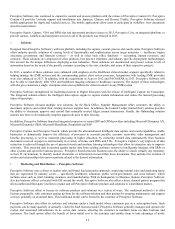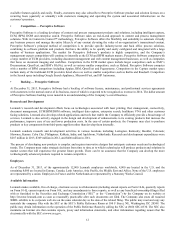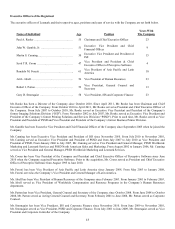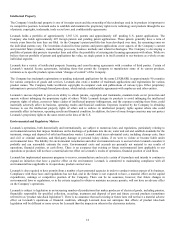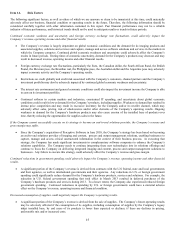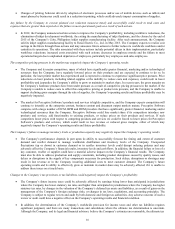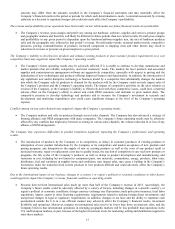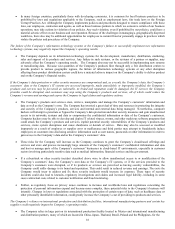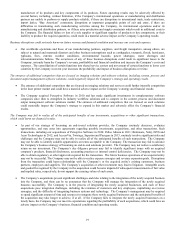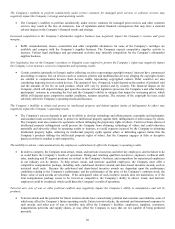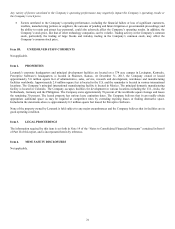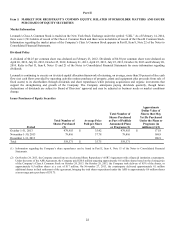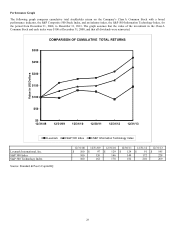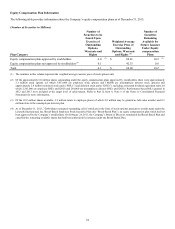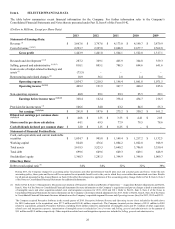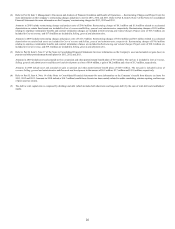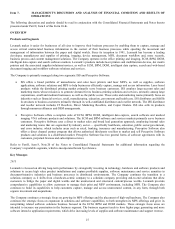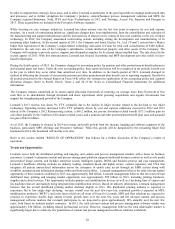Lexmark 2013 Annual Report Download - page 22
Download and view the complete annual report
Please find page 22 of the 2013 Lexmark annual report below. You can navigate through the pages in the report by either clicking on the pages listed below, or by using the keyword search tool below to find specific information within the annual report.
In many foreign countries, particularly those with developing economies, it is common for local business practices to be
prohibited by laws and regulations applicable to the Company, such as employment laws, fair trade laws or the Foreign
Corrupt Practices Act. Although the Company implements policies and procedures designed to ensure compliance with these
laws, our employees, contractors and agents, as well as those business partners to which we outsource certain of our business
operations, may take actions in violation of our policies. Any such violation, even if prohibited by our policies, could have a
material adverse effect on our business and our reputation. Because of the challenges in managing a geographically dispersed
workforce, there also may be additional opportunities for employees to commit fraud or personally engage in practices which
violate the policies and procedures of the Company.
The failure of the Company’s information technology systems or the Company’s failure to successfully implement new information
technology systems, may negatively impact the Company’s operating results.
The Company depends on its information technology systems for the development, manufacture, distribution, marketing,
sales and support of its products and services. Any failure in such systems, or the systems of a partner or supplier, may
adversely affect the Company’s operating results. The Company also may not be successful in implementing new systems
or transitioning data. Because vast quantities of the Company’s products flow through only a few distribution centers to
provide product to various geographic regions, the failure of information technology systems or any other disruption
affecting those product distribution centers could have a material adverse impact on the Company’s ability to deliver product
and on the Company’s financial results.
If the Company’s data protection or other security measures are compromised and, as a result, the Company’s data, the Company’s
customers’ data or the Company’s IT systems are accessed improperly, made unavailable, or improperly modified, the Company’s
products and services may be perceived as vulnerable, its brand and reputation could be damaged, the IT services the Company
provides could be disrupted, and customers may stop using the Company’s products and services, all of which could reduce the
Company’s revenue and earnings and expose the Company to legal claims and regulatory actions.
The Company’s products and services store, retrieve, manipulate and manage the Company’s customers’ information and
data as well as the Company’s own. The Company has invested a great deal of time and resources in protecting the integrity
and security of the Company’s products, services and internal and external data being managed. Nevertheless, computer
hackers will attempt to penetrate or bypass the Company’s data protection and other security measures and gain unauthorized
access to its networks, systems and data or compromise the confidential information or data of the Company’s customers.
Computer hackers may be able to develop and deploy IT related viruses, worms, and other malicious software programs that
could attack the Company’s products and services, exploit potential security vulnerabilities of the Company’s products and
services, create system disruptions and cause shutdowns or denials of service. Data may also be accessed or modified
improperly as a result of employee or supplier error or malfeasance and third parties may attempt to fraudulently induce
employees or customers into disclosing sensitive information such as user names, passwords or other information in order to
gain access to the Company’s data and/or the Company’s customers’ data.
These risks for the Company will increase as the Company continues to grow the Company’s cloud-based offerings and
services and store and process increasingly large amounts of the Company’s customers’ confidential information and data
and host or manage parts of the Company’s customers’ businesses in cloud-based IT environments, especially in customer
sectors involving particularly sensitive data such as medical information, financial services and the government.
If a cyberattack or other security incident described above were to allow unauthorized access to or modification of the
Company’s customers’ data, the Company’s own data or the Company’s IT systems, or if the services provided to the
Company’s customers were disrupted, or if its products or services are perceived as having security vulnerabilities, the
Company could suffer damage to its brand and reputation. This could result in reduced revenue and earnings. The costs the
Company would incur to address and fix these security incidents would increase its expenses. These types of security
incidents could also lead to lawsuits, regulatory investigations and claims and increased legal liability, including in some
cases contractual costs related to customer notification and fraud monitoring.
Further, as regulatory focus on privacy issues continues to increase and worldwide laws and regulations concerning the
protection of personal information expand and become more complex, these potential risks to the Company’s business will
intensify. Changes in laws or regulations associated with the protection of certain types of data, such as healthcare data or
other personally identifiable information, could greatly increase the Company’s cost of providing its products and services.
The Company’s reliance on international production and distribution facilities, international manufacturing partners and certain key
suppliers could negatively impact the Company’s operating results.
The Company relies in large part on its international production facility located in Mexico and international manufacturing
and distribution partners, many of which are located in China, Japan, Thailand, Brazil, Poland and the Philippines, for the
18


